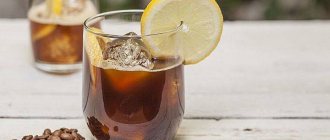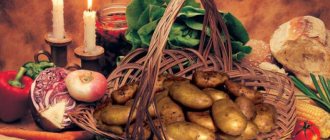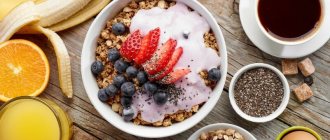Should I stop drinking coffee while breastfeeding?
According to scientific data, it takes about ten hours to remove caffeine from the body of an adult.
On average, one cup contains about 100 - 150 mg, and its maximum content in breast milk is reached after one hour. Can nursing mothers drink coffee, or should they not drink it during lactation? This question interests many mothers, especially “ardent” lovers of this drink.
General information about the effects of coffee on the body
This drink has a tonic, stimulating, invigorating effect, as well as improving brain activity and enhancing the digestive process.
It contains: caffeine, trigonelline, chlorogenic acid, vitamin P, essential oils, tannins.
This drink, like all food products, is absorbed into the blood and passes through breast milk to the baby. Therefore, if it is used excessively or if there are contraindications, side effects may occur.
It poses a particular threat in cases of prematurity and a tendency to allergic reactions.
The most common complications when using it during lactation are considered to be: an allergic reaction, sleep disturbance, overexcitation, capriciousness and tearfulness of the child, colic, anemia and dehydration in the baby.
Penetration of coffee into breast milk
When a nursing woman consumes it, the caffeine contained in it penetrates into the milk quite well, but is difficult to remove from the baby’s body. Therefore, if a mother drinks this drink regularly and in large quantities, caffeine accumulates in the baby’s body. In turn, this will negatively affect the well-being and condition of the child.
Different types of coffee have different caffeine content, and newborns and children under two years old cannot quickly eliminate it from the body. Therefore, this drink may contribute to side effects.
Average rates of caffeine excretion in children, depending on the age of the baby.
| Age | Number of hours |
| Premature | 66 – 105 |
| 0 – 3 months | 80 – 98 |
| 3 – 6 months | 14 — 15 |
| 6 months to 2 years | 2,5 – 10 |
Barley coffee recipe
In stores you can find various drinks based on barley grains, for example, “Health”, “Barley Ear”, “Golden Ear”, “Barley Mill”, “Tonus” and others. They can be either pure or with the addition of various other ingredients, for example, berries, chicory, other cereals, echinacea, cardamom. You can also make barley coffee yourself.
We recommend finding out what green coffee is made from.
We have selected several recipes for you.
Recipe 1. “Classic”
- Rinse 3 teaspoons of large barley grains several times under running water.
- Then place them on a napkin, on a horizontal surface, so that they dry well.
- Pour the dried barley into a hot frying pan.
- Fry with continuous stirring until the grains become dark in color and acquire a characteristic smell.
- Remove from the pan and cool.
- Grind in a coffee grinder.
- Pour 150–200 ml of cold purified water into the Turk.
- Add the ground grains.
- Boil.
- Let it brew for 3-5 minutes.
Important! To enhance the nutritional value and benefits of barley coffee drink, rye is added to it. And to get a rich color and aroma close to coffee, add chicory.
Recipe 2. “Barley with rye”
- Rinse 2 tablespoons of barley and 2 tablespoons of rye under running water.
- Place in a bowl and add water to cover the grains by 2-3 cm in height. Soaking should last for one night.
- In the morning, remove the water. Rinse the grains under running water.
- Boil water.
- Pour the grains into boiling water.
- Once they begin to open, remove and place in a colander.
- Wash the grains, then dry and fry until dark.
- Grind in a coffee grinder.
- Pour 200 ml of cold purified water into the Turk.
- Add the ground grains.
- Boil.
- Cover with a lid and let sit for 3-5 minutes.
Recipe 3. “With milk”
- Mix 200 ml milk and 100 ml water.
- Place 4 tablespoons of ground barley grains in milk and water.
- Boil and cook for 2-3 minutes.
To improve the taste of barley coffee, you can add sugar, milk, cream, ice cream, lemon, cinnamon, and honey. If you prepare it with milk, it will be somewhat reminiscent of cappuccino. It forms a thick and high foam. The aroma is subtle, bready. A smell close to coffee can be achieved by adding chicory.
Negative effects of caffeine on a baby while breastfeeding
The effects of this drink are varied. It affects many organs and systems. For example, it acts on the baby’s body in the following way:
- promotes overexcitation, tearfulness and irritability;
- causes allergic reactions;
- has a diuretic effect;
- removes calcium and other minerals;
- consuming it in large quantities helps to reduce the concentration of iron in breast milk and leads to the development of anemia in the baby.
It is necessary to immediately stop taking this drink if caffeine or drugs that have a similar effect (for example, theophylline, etc.) are prescribed.
Experts' opinion
Answering questions on the topic of drinking coffee while breastfeeding, Komarovsky gives clear answers when it should be excluded or the dose should be reduced during lactation:
- if the baby has an allergy in the form of a rash or abnormal bowel movements;
- if the baby does not sleep well, is capricious for no reason;
- if there is a need to use a special drug called Theophylline, the composition of which is close to that of caffeine.
In all other cases, Komarovsky, like other experts, consider it possible to consume the drink in acceptable quantities.
Misconceptions about drinking coffee while breastfeeding
There are many misconceptions about its use during lactation. And here are some of them.
- When choosing drinks, preference should be given to green tea. This opinion is considered erroneous because it also contains caffeine (theine), which irritates and excites the nervous system.
- It is recommended to replace this drink with decaffeinated coffee. But the mistake is that it also contains it, but just in smaller quantities. The disadvantage of this type of coffee is its high cholesterol content, which can negatively affect the baby.
- During breastfeeding, the mother should eat and drink everything that she consumed before pregnancy and childbirth, and then her baby will quickly adapt to food. This is not true, since all products are an excessive burden on the baby’s still unformed digestive system. Therefore, it is recommended to introduce adult food into his diet only from six months.
- Many mothers believe that drinking a couple of cups of this drink daily will not affect the condition of the baby in any way. But you should know that if there are contraindications, a tendency to allergies, not only adverse reactions may occur, but also addiction to it.
Which coffee should you choose?
Decaffeinated - understandable, but what about more detailed characteristics? On the shelves there are instant, ground, and bean varieties; many can be ordered in online stores. A young mother has no time to compare all the features.
- Coffee beans are the best option. Especially if it is highland Arabica, it contains less caffeine. It is advisable to buy a coffee grinder and grind the beans immediately before cooking, but if this option is not suitable, take the beans and ask them to grind them in the store.
- Ground decaffeinated coffee in packages will also work, but who knows what's inside. Take packs from well-known global manufacturers, you can order from European countries.
- Soluble - strictly prohibited. Not only are the cheapest grains used, but they are also processed using a variety of chemicals. There are also dyes, emulsifiers and stabilizers that are definitely harmful to the child. There is no talk of powder ones at all, but even the seemingly expensive and good freeze-dried options will not suit you.
If it is not possible to brew a drink, do not take instant. Choose ground and brew with boiling water.
If you really want... Which drink should you prefer?
In the absence of contraindications, drinking coffee in a reasonable amount is not prohibited. However, if the mother is accustomed to it or has developed a dependence on it, it can be replaced with: chicory, herbal infusions, anise, cumin, barley drink, herbal teas, dill water, etc.
If you really want coffee, it is better to follow the following rules:
- use it in the morning so as not to once again provoke restless sleep in the baby;
- It is better to drink it after you have fed the baby, so the nursing woman’s body will have two hours more time to remove caffeine before feeding the baby;
- do not drink coffee daily so that its concentration in milk decreases;
- consume more dairy products;
- it is necessary to increase the general drinking regime, since this drink increases the removal of fluid from the body;
- dilute it with milk.
It is not recommended to consume this drink until at least three months of age.
How to choose coffee?
During breastfeeding, preference should be given to freshly ground beans that have a coarse grind (as they contain less caffeine).
If you grind the beans and brew the coffee before consuming it, the caffeine content in it will be several times less than in what was ground industrially.
It is better not to drink instant coffee, since mostly low grades are used for this type of drink. There is also a chance that you can buy freeze-dried powder with artificial caffeine instead (which contains twice as much caffeine as coffee beans).
How to cook?
Before brewing this drink, you need to grind just enough grains to be enough for one time.
You need to pour clean spring water or filtered water into the Turk (up to its neck), then add two teaspoons of ground grains (per serving), and, if desired, one or two spoons of granulated sugar. The drink must be brewed over low heat. When the foam begins to rise, you should set the Turk aside so that it settles a little. This procedure must be repeated three times. After this, the drink can be poured into cups.
Frequency of coffee consumption by women during lactation
It is prohibited to drink more than 3 to 4 cups of this drink during lactation, as side effects may occur.
If the mother is a coffee lover and cannot give it up during breastfeeding (given that there are no other contraindications), then it is permissible to drink a couple of cups a day.
But it is very important to monitor the baby’s reaction, and it is also necessary to exclude all other products containing caffeine.
Coffee with milk
Can a nursing mother have coffee with milk and is it healthier?
In the absence of an allergic reaction to coffee and if it is tolerated, it is better to drink this drink with milk. Since it contains a lot of calcium, and it is necessary for the baby’s bones to be healthy and strong. In addition to calcium, milk contains zinc, which has a beneficial effect on the baby’s skin, nails and hair.
Until the age of six months, the mother should not drink more than 50 ml of milk per day, since in addition to allergic reactions, the baby may also experience intestinal problems (increased gas production, abdominal pain, bowel dysfunction). After the child reaches this period, you can gradually increase the volume of milk to 200 ml.
Milk should be natural, not ultra-pasteurized. Its fat content should be from 2.5%. It is permitted to consume this product in store-bought bags or packaging.
Nutrition for a nursing mother. Word to the allergist
How is breast milk created?
Mother's milk is a unique creation of living nature. This is nutrition that is created by your body specifically for your child, as if it were the most personalized therapy. Mother's milk is exactly the product that her baby needs at all stages of its development until it outgrows this need. Breast milk is produced by special glandular cells in the breast, they specialize only in the production of milk and colostrum. Nutrients, vitamins, biologically active substances, trace elements and beneficial bacteria enter the glandular cells of the mammary gland from the blood and lymph. And there, in turn, from the internal resources of the body and from food. Food travels a long way to the mammary gland: the oral cavity, esophagus, stomach and intestines, where food is absorbed and digested, then the blood enters the liver, where it is “purified” and then goes to the mammary glands. Some nutrients, especially fats, circulate mostly in the lymph. And from the lymphatic system they enter the mammary glands. Thus, substances from food do not pass directly from the intestines into breast milk. They travel a long way and the secretion of substances from food into breast milk is quite individual and unpredictable.
So, a study was conducted where nursing mothers ate chicken eggs, and then the presence of chicken egg protein in breast milk was checked. It turned out that a quarter of women do not excrete chicken egg white into milk at all for some reason! This may be a surprising fact, given the belief that all products that enter the mother's body through food immediately end up in milk.
Can breast milk be “empty”, “bad”?
Breast milk is always the best for your baby, no matter what you eat or don't eat. Its composition changes little depending on the presence or absence of any foods in your diet. But if you do not get enough nutrients, vitamins and minerals from food, then these substances will enter the milk at the expense of your body. Therefore, we can immediately say: for the nursing mother, for the sake of, first of all, her own
health, you should eat well. In fairly rare cases, a child is allergic to some food protein, and if this protein is present in the mother's milk, it can cause some symptoms in the baby until it is excluded from the mother's diet. However, there cannot be an allergy to the components of breast milk itself, to human proteins! They are neutral for the child's body.
Allergies and breastfeeding. How are they connected?
Food allergies
- This is a fairly rare condition, both among children and adults and occurs in only 2-5% of the entire population. Often food allergies are diagnosed where none exist, and the mother is recommended to go on a strict diet for a long time. Let's figure out how allergies in a breastfed baby can depend on his mother's diet.
Allergen
– this is a foreign protein. With food, the protein enters the bloodstream and is carried throughout the body, including in some quantities penetrating into breast milk. Most often, allergies in children are caused by cow's milk protein, chicken egg protein, and much less often by wheat, soy, fish, seafood, nuts, and peanuts. These are the so-called “big eight” allergens. There is an assumption that human ancestors were not adapted for such a mass culture of farming and agriculture, as well as the fishing industry. Therefore, a diet consisting of 90% dairy products, bread and other wheat products, eggs, and in some regions of the world soy, rice, fish and seafood has led to such a frequency of sensitization (increased sensitivity) of people to these foreign proteins.
Pseudo-allergy.
Histamine liberators are foods that, without the participation of the immune system, can increase histamine levels or themselves contain a lot of histamine. Reactions to them are dose-dependent, not dangerous and pass quickly (temporary redness, slight itching). Histamine liberators include red fruits, vegetables, berries, citrus fruits, cocoa, chocolate, red wine, fermented cheeses, smoked meats and marinades, smoked fish, red fish, caviar, honey. It is absolutely not necessary for all nursing mothers to exclude them from the diet.
Allergic reaction
appears
immediately
(maximum within 1-2 days for delayed reactions such as gastrointestinal reactions and exacerbation of atopic dermatitis). A typical allergy is Quincke's edema, urticaria immediately after consuming the product.
Allergies cannot accumulate and cannot be hidden. This is a reaction.
Either a person has an allergy or he doesn’t. If it exists, then it manifests itself under any conditions upon contact with an allergen. Even the presence of IgE antibodies in the blood does not mean for sure that a person will have a reaction to this allergen, he just has antibodies.
An allergy is not a specific rash.
It is impossible to simply glance at a person and without learning anything about his life history and illness to say that he has an allergy. An allergist, like Sherlock Holmes, looks for an allergen using leading questions and sometimes tests and analyses. It is not only the external manifestation that is important, but also a clear symptom-allergen connection, reproducible and repeatable. Manifestations of food allergies in infants can include not only skin rashes, but also significant stool disorders, streaks of blood in the stool, excessive regurgitation, and poor weight gain. Skin rashes are very important not to be confused with other skin conditions, such as diaper rash, prickly heat, diaper dermatitis, dry skin, atopic dermatitis, viral rashes, transient erythema in newborns, neonatal acne, etc.
Allergic diseases
are not inherited, only the predisposition to them is passed on.
Such a common disease as atopic dermatitis is not always
associated with food allergies. It often happens that only the state of the damaged skin barrier plays a big role here.
Basic facts of modern allergology regarding food allergies in children.
Variety is everything!
Modern scientific research has proven that a hypoallergenic diet
during pregnancy and lactation
does not reduce the risk of
developing allergies in the child. On the contrary, deliberate exclusion of all potentially allergenic foods from a pregnant and lactating woman's diet increases the risk of allergies because tolerance (tolerance) to these foods cannot be developed. The child’s body must gradually become familiar with all products in order to learn to build its barriers and react correctly to foreign substances. For the mother’s body after childbirth, it is very important to eat well, including vegetables, fruits, nuts, and fish!
Find and neutralize the allergen!
an unusual, strong immediate reaction in your child
on some product in your diet, then exclude this product for now, contact a breastfeeding-friendly pediatrician or allergist. The doctor will ask you to follow a diet for some time with the exclusion of the intended product (elimination diet), and do allergy tests.
1) For atopic dermatitis, an elimination diet is prescribed for no more than 2-4 weeks
! If there is no improvement, the product is administered again. Under no circumstances should you be on a strict diet with the exclusion of many foods important for the body for more than 4 weeks!
2) There is never a need to stop breastfeeding!
Just exclude the found allergen/new ones from the diet. Breast milk is always better than any formula, even for various allergic conditions. If you are asked to stop breastfeeding, consult another specialist.
3) Exclude from your diet only those foods that you yourself
there is an allergic reaction. This is a clear and obvious fact. But the same allergies as mom or dad, for example, to cats or nuts, are not so strictly transmitted to the child. A child may not have any allergy at all or may develop an allergy to birch pollen. Everything is individual.
So, regarding allergies and breastfeeding, we can say the following: a nursing mother needs to eat a nutritious and varied diet. Even if you are at risk of developing allergic diseases, you do not need to limit yourself to a hypoallergenic diet. If a doctor proves an allergic reaction to any product, then it is excluded from the mother’s diet for 6 to 24 months. The duration of the elimination diet is determined by the doctor. Then the product is tried again. Most often, babies are allergic to the protein of cow's milk and chicken eggs. Allergies to these products usually go away with age and tolerance develops. Canceling breastfeeding for allergic diseases is not required.
Should a nursing mother eat for two?
No, that's unnecessary. The “production” of breast milk requires 400-500 calories more than usual. Moreover, the body can use these calories from reserves accumulated during pregnancy. Breastfeeding helps you lose weight! Therefore, a nursing mother needs to eat according to her appetite, preferably more often, in small portions. Snacks are allowed.
Colic is caused by cabbage, peas and other foods in the mother's diet. Is it so?
There is currently no reliable evidence that certain foods cause increased gas formation in a baby. Therefore, excluding cabbage, fresh vegetables and fruits and other products from the diet for which mother or grandmother “fears” is completely unnecessary. Of course, if these foods cause bloating in the nursing mother herself, then there is no need to consume them. But they are unlikely to have any effect on the child. Most children from 3 weeks to 3 months experience colic, and this in no way depends on the mother’s diet. Most likely, this is some kind of migraine in children (perhaps the baby just has a severe headache or tummy ache). You need to try to introduce a protective regime: warmth, silence, darkness and breastfeeding in the evening in the dark in order to convey the sleep hormone melatonin to the baby. Time and love help with colic, but not a strict diet.
The baby's gastrointestinal system is still developing, so there may be gas and a bloated tummy. Foamy, abundant stools with greens most often indicate transient lactase deficiency, which is easily overcome by breastfeeding or, in extreme cases, by adding the lactase enzyme for a while. To do this, contact a breastfeeding-friendly pediatrician and breastfeeding consultant. Bloating, gas, colic, if the child develops normally and gains weight, does not require the mother to diet, much less stop breastfeeding or prescribe antibacterial drugs.
Can a nursing mother eat sweets and spices?
Like any non-lactating or non-pregnant woman, a nursing mother can eat sweets, but it is better not to abuse simple carbohydrates and include dried fruits and nuts in your diet. Not to overindulge means: not eating two bars of chocolate or ten buns in one sitting. This will have an adverse effect on your figure and metabolism. And drinking tea with cookies or a slice of chocolate is quite possible and necessary. As for spices, onions and garlic: they do not have a bad effect on the baby’s health. A small amount of them even slightly changes the taste of breast milk. But it is useful for the baby to get used to the traditional tastes of his culture through milk. So, in our country it can be fried potatoes with garlic and pickled cucumber, and in India it can be curry and other spices.
Can a nursing mother drink alcohol and coffee?
Coffee is preferably no more than 200 mg of caffeine per day. This is about 2 cups of strong coffee or 3-4 weak coffee with milk. The risk of an allergy to coffee is minimal, but caffeine can pass into breast milk in large quantities and affect the baby’s nervous system. Alcohol in moderate doses and occasionally is acceptable during breastfeeding. There is no need to express milk after a glass of wine. After 2-3 hours, the ethyl alcohol itself will leave the breast milk and you can feed the baby.
Dear nursing mothers, eat varied and with pleasure! A happy and healthy mother has a happy baby! Delicious milk everyone!
Author of the article: pediatrician, allergist, breastfeeding and sleep consultant Yulia Bunina
List of used literature (research):
Ø Francesca Bravi, Frank Wiens, Adriano Decarli, Alessia Dal Pont, Carlo Agostoni, Monica Ferraroni, Impact of maternal nutrition on breast-milk composition: a systematic review, The American Journal of Clinical Nutrition
, Volume 104, Issue 3, September 2021, Pages 646–662,
Ø EAACI Food allergy and anaphylaxis guidelines 2014
Ø Susana Ares Segura, José Arena Ansótegui, N. Marta Díaz-Gómez, La importancia de la nutrición materna durante la lactancia, ¿necesitan las madres lactantes suplementos nutricionales?,Anales de Pediatría, Volume 84, Issue 6,2016
Ø Federica Minniti, Pasquale Comberiati, Daniel Munblit, Giorgio L. Piacentini, Elisa Antoniazzi, Laura Zanoni, Attilio L. Boner and Diego G. Peroni, “Breast-Milk Characteristics Protecting Against Allergy”, Endocrine, Metabolic & Immune Disorders - Drug Targets (2014) 14:9.
Ø Ventura A, K: Does Breastfeeding Shape Food Preferences Links to Obesity. Ann Nutr Metab 2017;70(suppl 3):8-15.
Ø Joanne M Spahn, Emily H Callahan, Maureen K Spill, Yat Ping Wong, Sara E Benjamin-Neelon, Leann Birch, Maureen M Black, John T Cook, Myles S Faith, Julie A Mennella, Kellie O Casavale, Influence of maternal diet on flavor transfer to amniotic fluid and breast milk and children's responses: a systematic review, The American Journal of Clinical Nutrition
, Volume 109, Issue Supplement_1, March 2021, Pages 1003S–1026S,
Ø Metcalfe, JR, Marsh, JA, D'Vaz, N., Geddes, DT, Lai, CT, Prescott, SL and Palmer, DJ, Clinical & Experimental Allergy
, 2021 ( 46) 1605– 1613.
Ø Amy A. Gelfand, Infant Colic, Seminars in Pediatric Neurology, Volume 23, Issue 1, 2021, Pages 79-82
Ø Wollenberg, A. , Barbarot, S. , Bieber, T. , Christen-Zaech, S. , Deleuran, M. , Fink-Wagner, A. , Gieler, U. , Girolomoni, G. , Lau, S. , Muraro, A. , Czarnecka-Operacz, M. , Schäfer, T. , Schmid-Grendelmeier, P. , Simon, D. , Szalai, Z. , Szepietowski, J. , Taïeb, A. , Torrelo, A. , Werfel , T. , Ring, J. and , (2018), Consensus‐based European guidelines for the treatment of atopic eczema (atopic dermatitis) in adults and children: part I. J Eur Acad Dermatol Venereol, 32: 657–682.
Ø J MURUGU SARASU, MANISH NARANG AND DHEERAJ SHAH. Infantile Colic: An Update. Indian Pediatr 2021 Nov
Ø Oddy W, H: Breastfeeding, Childhood Asthma, and Allergic Disease. Ann Nutr Metab 2017;70(suppl 2):26-36.
Ø Blanchard, Carine. A history into genetic and epigenetic evolution of food tolerance: how humanity rapidly evolved by drinking milk and eating wheat. Current Opinion in Allergy and Clinical Immunology: December 2021 – Volume 17 – Issue 6 – p 460–464
Ø Maternal diet during pregnancy and lactation and cow's milk allergy in offspring. J Tuokkola, P Luukkainen, H Tapanainen, M Kaila, O Vaarala, MG Kenward, LJ Virta, R Veijola, O Simell, J Ilonen, M Knip & SM Virtanen. European Journal of Clinical Nutrition volume 70, pages 554–559 (2016)
Ø Metcalfe, JR, Marsh, JA, D'Vaz, N., Geddes, DT, Lai, CT, Prescott, SL and Palmer, DJ, Effects of maternal dietary egg intake during early lactation on human milk ovalbumin concentration: a randomized controlled trial. Clinical & Experimental Allergy, 2021 (46) 1605–1613.
Ø Importance of maternal diet in the training of the infant's immune system during gestation and lactation. P. V. Jeurink, K. Knipping, F. Wiens, K. Barańska, B. Stahl, J. Garssen. Critical Reviews in Food Science and Nutrition. Volume 59, 2021 – Issue 8Pages 1311-1319
Ø Palmer, DJ, Gold, MS and Makrides, M. (2008), Effect of maternal egg consumption on breast milk ovalbumin concentration. Clinical & Experimental Allergy, 38: 1186–1191.
Ø Jessica H. Savage, Kathleen A. Lee-Sarwar, Joanne E. Sordillo, Nancy E. Lange, Yanjiao Zhou, George T. O'Connor, Megan Sandel, Leonard B. Bacharier, Robert Zeiger, Erica Sodergren, George M. Weinstock, Diane R. Gold, Scott T. Weiss, Augusto A. Litonjua, Diet during Pregnancy and Infancy and the Infant Intestinal Microbiome, The Journal of Pediatrics, Volume 203, 2021, Pages 47-54.e4,
Ø Detection of β-lactoglobulin in human breast-milk 7 days after cow milk ingestion. Ponpan Matangkasombut, Savitree Padungpak, Sasikanya Thaloengsok, Wasu Kamchaisatian, Cherapat Sasisakulporn, Wanlapa Jotikasthira,. Paediatrics and International Child Health Volume 37, 2021 – Issue 3 Pages 199-203
Ø Zhu J, Garrigues L, Van den Toorn H, Stahl B, Heck AJR. Discovery and Quantification of Nonhuman Proteins in Human Milk. J Proteome Res. 2019;18(1)
Looking for an alternative to coffee
If a mother or child has contraindications to its use, it is recommended to exclude coffee from your diet (at least temporarily).
But what to do if mom loves him very much or one or two cups a day is not enough for her? In this case, you can find an alternative to coffee.
Substitutes for this drink are:
- chicory. It contains many vitamins, macro- and microelements, as well as many other useful components. This drink has a calming effect on the nervous system, gastrointestinal tract, improves metabolic processes in the body;
- barley drink. One of its important advantages is increased lactation. It contains proteins, vitamins, plant fiber, and mineral salts. Barley drink improves the functioning of the kidneys and digestive system;
- acorn coffee. This drink contains a lot of protein, tannic acids, starch substances, and plant flavonoids. Thanks to which it has an anti-inflammatory, antibacterial effect, and acorn coffee normalizes the functioning of the cardiovascular, nervous, respiratory and digestive systems.
Decaffeinated coffee in a cafe
In ordinary establishments you are unlikely to be given a natural decaffeinated drink. It’s better to go to coffee shops or chain establishments that sell coffee and brew it on the spot or take it with you. Ask for decaf coffee, ask what beans are used, they may show you the packaging.
Do not add any syrups, not even vanilla or caramel. There is not natural vanilla, caramel or chocolate, but chemical concentrates. You will significantly increase the risk of allergies in your child. Only pure coffee, preferably with milk.
Pediatrician's opinion on coffee during breastfeeding
In reasonable quantities, its use does not pose a particular threat to the health of the mother and baby.
But if there are contraindications, it should not be used (for example, the child was born premature, there are manifestations of an allergic reaction, etc.), as adverse reactions may occur. It is recommended not to drink this drink until the baby is three months old, since the rate of caffeine elimination from the body during this period is very low. But still, if a mother cannot completely give up coffee, she should not abuse it. If the “craving” is very high, then it is better to replace it with alternative drinks.
Conclusions:
- World doctors do not ban coffee. Domestic ones are more wary, but in general they allow its use, especially without caffeine.
- Dr. Komarovsky allows mothers to drink coffee if the child does not have allergies and generally feels well.
- Choose natural high-mountain Arabica beans, or, as a last resort, ground coffee. Soluble is strictly prohibited! No syrups.
- It is recommended to start drinking coffee no earlier than 2 months after the baby is born.
- Monitor the child's condition: most mothers calmly drink decaffeinated coffee, and this does not affect the child.
Replenishing nutritional deficiencies through food
The nutrients found in breast milk can be divided into two groups. The concentration of substances from group No. 1 directly depends on the mother’s diet, while substances from group No. 2 are released into breast milk regardless of whether the woman consumes them with food or not.
In other words, nutrients from group No. 1 are necessary for mother and baby, while nutrients from group No. 2 are needed only to maintain the health and well-being of the woman.
Here are some foods that contain vitamins, minerals, and beneficial plant compounds in both groups:
Group No. 1
- Vitamin B1: fish, pork, seeds, nuts, beans;
- Vitamin B2: cheese, almonds, nuts, red meat, fatty fish, eggs;
- Vitamin B6: chickpeas, nuts, fish, poultry, potatoes, bananas, dried fruits;
- Vitamin B12: shellfish, liver, yogurt, fatty fish, nutritional yeast, eggs, crab, shrimp;
- Choline (organic compound): eggs, beef liver, chicken liver, fish, peanuts;
- Vitamin A: sweet potatoes, carrots, dark leafy greens, liver, eggs;
- Vitamin D: cod liver oil, fatty fish, some mushrooms;
- Selenium: Brazil nuts, seafood, turkey, whole wheat, seeds;
- Iodine: dried seaweed, cod, milk, iodized salt.
Group No. 2
- Folate is a form of vitamin B9 that is found naturally in foods such as beans, lentils, leafy greens, asparagus, avocados;
- Calcium: milk, yogurt, cheese, leafy greens, legumes;
- Iron: red meat, pork, poultry, seafood, beans, green vegetables, dried fruits;
- Copper: shellfish, whole grains, nuts, beans, liver, potatoes;
- Zinc: oysters, red meat, poultry, beans, nuts, dairy products.
Contraindications and harm
As you can see, barley drink has many advantages and beneficial effects. But it has practically no contraindications. There are only 2 points when this coffee substitute can cause harm:
- If abused. A person who drinks too strong a drink, often and in large doses, risks gaining extra pounds.
- If you have a history of celiac disease (disease of the small intestine). With this disease, the gluten protein of cereals is not broken down and is not absorbed. Therefore, a person who consumes this drink may face a number of health problems due to this indigestion.
Important! Doctors and nutritionists advise drinking no more than 4–5 cups of barley coffee drink per day.
Thus, if you have any health problem and are contraindicated from drinking regular coffee for medical reasons, you can introduce barley drink into your diet. It has a rich vitamin and mineral composition, it costs several times less, and there are much fewer contraindications than coffee, since it does not contain caffeine and is not addictive.
Barley drink has a powerful strengthening effect and helps people who are experiencing stress or serious physical activity to recover faster. It is recommended for restorative nutrition and in complex therapy for many diseases.
Nutrition Coffee Drinks Coffee substitutes Benefits and harms of drinks Hot drinks
Harm of coffee for mother
When drinking this drink, a woman needs to take into account the following features:
- Coffee can cause dehydration. A lack of fluid in the body of a nursing mother is fraught with ailments and a decrease in breast milk production. Therefore, when drinking coffee, you need to drink more water. The optimal combination is: for one cup of coffee - one “extra” glass of water per day.
- Coffee helps remove calcium from the body. Most nursing mothers already have a “complicated relationship” with this element - it is often lacking. And coffee makes the problem worse. Therefore, when drinking an invigorating drink, it is necessary to include more fermented milk products in the diet or take additional calcium.
What danger does it pose to mother and baby?
Practice shows that mothers who drink coffee expose their babies to some dangers:
- Caffeine increases nervous excitability. The child may have sleep disturbances, lack of appetite, tearfulness, and irritability.
- Coffee is an allergic product. The baby may suffer from constipation and diarrhea.
- This drink has diuretic properties.
- If the child has already been prescribed caffeine, the mother is prohibited from drinking coffee. For example, caffeine can be found in painkillers and lung medications.
IMPORTANT! If your child cannot be put to sleep or if he begins to wake up frequently at night, you should not drink the drink. However, not all babies react to caffeine with rashes and hyperactivity.
There are myths about coffee. They read:
- Coffee can be replaced with green tea without harm to the child. This is misleading because tea also contains caffeine. Moreover, its content is several times higher than in black tea and coffee.
- You can safely drink decaffeinated coffee. In fact, there is caffeine there, but in small quantities. Therefore, you should not abuse this drink.
- Green coffee. It is believed to have a good effect on the body and even promote weight loss. However, this type of drink is a semi-finished product that requires roasting. Yes, and you should not lose weight while breastfeeding, since refusal of adequate nutrition will affect the quality of milk.
- A small child should be introduced to adult food as early as possible. The baby’s digestive system is not ready for such a shock. While it is not working at full capacity and does not have enough enzymes to digest food.
- One or two cups of coffee a day will not be addictive and will not harm the baby. Doctors say the opposite: you can get used to coffee, but giving up this habit is very difficult. However, you should think about the baby's health.
Caffeine cannot be eliminated from the child's body. Up to two years it will simply accumulate, and this will cause disruption in the functioning of the nervous system.
“Allergy” to breast milk. Myths and reality
One of the main questions that a nursing mother has after giving birth is: what can she eat and how will it affect the baby. In our articles you will find recommendations on organizing nutrition for a nursing mother; and in this article we will look in detail at what food reactions a child has, what foods most often cause them, whether they can be prevented, and what to do if they have already occurred.










